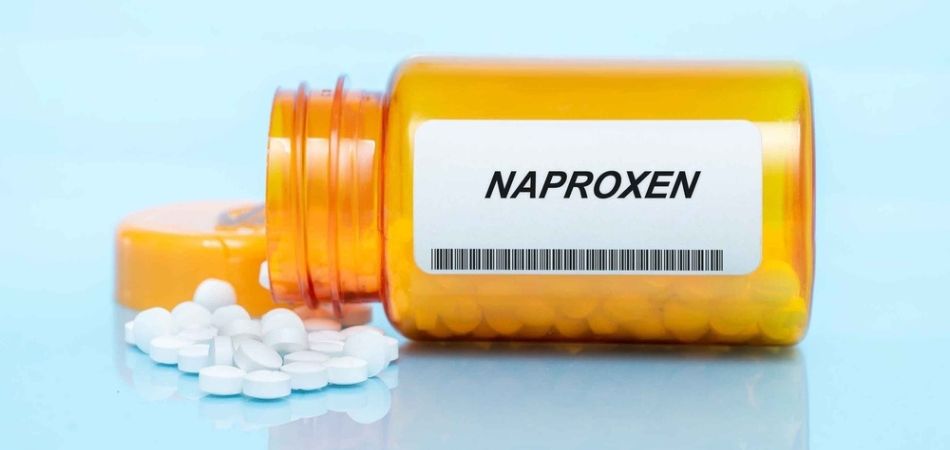Last Updated:
August 7th, 2025
We can never anticipate when life throws us a curveball. Minor accidents that leave us in pain can happen at any time, so most of us keep a regular supply of painkillers at home.
Yet, if we have been regularly drinking or are still under the effects of alcohol, taking a painkiller like naproxen may not be as safe as we first thought.

What is naproxen and how is it used?
Naproxen is a type of analgesic drug, also called a painkiller, used to relieve different types of pain. It’s a non-steroidal anti-inflammatory drug (NSAID) that can be used to reduce swelling and stiffness throughout the body. Naproxen is commonly prescribed for conditions like arthritis, muscle aches and back pain. While paracetamol is usually the best treatment for most types of pain, naproxen can be better for some types, such as period pain.
Naproxen works by blocking the body’s production of prostaglandins, which are the chemicals produced for pain and inflammation. Inflammation is your body’s natural response to pathogens invading the body, so to some extent, inflammation is a good thing.
Though often looked at as a routine painkiller, naproxen use is not risk-free. It can carry certain side effects, especially when taken frequently or in high doses. These mild to severe dangers can be amplified when alcohol is added to the mix.
What happens when you mix naproxen and alcohol?
When taken on their own, both naproxen and alcohol share some common risks to the body. Both substances alone can affect your stomach lining, liver, and digestive process. These are the sole risks, but when combined, they can have a compounding effect on the body.
While the NHS states that low doses of alcohol and naproxen won’t pose a serious threat, when the two are mixed, interactions can include:
- Severe stomach irritation: Naproxen reduces protective prostaglandins, while alcohol boosts stomach acid, raising the risk of inflammation and ulcers.
- Increased risk of gastrointestinal bleeding: The protective lining of the stomach is weakened, making bleeding more likely, especially with long-term use.
- Liver strain and toxicity: Both substances are processed by the liver, which can lead to liver damage when overworked or more severe hepatotoxicity.
What are the health risks when mixing the two?
A high dosage of Naproxed mixed with large quantities of alcohol may carry some health risks. Both are commonly used throughout the country, but their combined impact can damage vital systems in your body, especially with repeated or long-term use.
Some of the main health risks (for high dosage) you should be aware of include:
- Gastrointestinal bleeding and ulcers: One of the most serious risks is internal bleeding. Naproxen thins the stomach lining, while alcohol increases acid levels. Together, high doses can lead to ulcers or potentially life-threatening bleeding in the digestive tract.
- Liver damage: Both naproxen and alcohol are metabolised by the liver. Taking them together can heighten the risk of liver inflammation or long-term damage, particularly in people who drink heavily or already have liver issues.
- Kidney strain: Naproxen can reduce blood flow to the kidneys. When alcohol is in your system, the risk of kidney impairment or even failure increases, especially if you already have kidney concerns.
- Delayed recovery from injury or illness: Alcohol symptoms can interfere with healing and immune function. If a person is taking Naproxed to reduce pain or inflammation, alcohol’s effects can ultimately slow down their recovery.
The combination of alcohol and naproxen may increase prescription drug addiction side effects, especially in vulnerable individuals.
Who is most at risk of harm?
Most of the risks carried when mixing alcohol and naproxen can affect anyone, but certain people may face a higher chance of serious complications. You may be more vulnerable to risks if:
- You drink alcohol regularly or heavily: Chronic alcohol use already puts strain on your liver and digestive system. Adding naproxen can tip the balance toward damage or bleeding.
- You’re over 60 years old: While kidney problems can develop at any stage in life, research shows that people over the average age of 60 are more likely than not to develop kidney disease.
- You have pre-existing liver, kidney or gastrointestinal conditions: If your body already faces impairment or has suffered organ damage, combining naproxen and alcohol could accelerate detrimental conditions.
- You have asthma: Research indicates that NSAIDs can induce bronchospasm and, in rare cases, the reaction can lead to fatal outcomes. Reports on incidence rates can vary between 8% and 20% of adults who have asthma.
- You take other medications: Certain drugs, especially blood thinners, other NSAIDs, or antidepressants, can interact badly when alcohol and naproxen are involved.
If you fall into any of these categories, it’s especially important to avoid mixing the two and to speak with a healthcare professional about safer pain relief options.
Are there safer alternatives for managing pain?
If you regularly drink alcohol or are concerned about the risks of combining it with naproxen, you should consider the option of safer ways to manage pain. It’s important to understand that not all pain relief options work the same way or carry the same risks. Some may be better suited to your lifestyle or health needs.
Some alternatives to consider may include:
- Paracetamol (acetaminophen): Often considered gentler on the stomach than NSAIDs, paracetamol may be safer for occasional use, but it still carries liver risks if mixed with large amounts of alcohol.
- Topical NSAIDs: Creams or gels that contain anti-inflammatory agents (like diclofenac) are applied to the skin and have less impact on the stomach or liver than oral medications.
- Physical therapy and exercise: For chronic pain, physiotherapy or gentle movement (like swimming or yoga) can reduce discomfort without any chemical risks.
- Heat and cold therapy: Simple tools like hot water bottles or ice packs can ease inflammation and muscle pain, if your case is not too severe.
- Speaking to a GP or pharmacist: They can help you explore medications that won’t interfere with alcohol, or advise if a short break from drinking might be worth it while treating pain.
Always read the label, and never assume a medicine is “safe” to mix with alcohol just because it’s available over the counter.
How to seek help if alcohol is affecting your medication use
If you’ve found yourself mixing alcohol with medications like naproxen, it may be time to take a closer look at your relationship with alcohol. While Naproxe does not fall into the category of drugs that carry a high risk of addiction, alcohol’s addictive properties should never be overlooked.
There may be a few signs to watch for that alcohol is interfering with your health or medication use, including:
- You continue drinking despite side effects or medical advice
- You take painkillers after drinking to “balance things out”
- You’ve forgotten how much you’ve taken or lost track of timing
- You feel anxious or irritated when asked to reduce drinking
Understanding alcohol effects on the body is essential when you’re also taking medications like naproxen. Common symptoms of alcohol abuse can worsen if you take naproxen. If you’re struggling to cut back or need help with alcohol, it’s important to speak to a healthcare professional.
A GP, pharmacist, or alcohol addiction specialist can help you understand what’s going on and what steps to take next. Recognising the pattern early can protect your long-term health and prevent the cycle from becoming harder to break.
Where can I get support for my addiction?
If alcohol is interfering with your health, your safety, or your ability to take medication as prescribed, it may be time to seek help. Don’t wait for things to get worse. Support is available right now.
We provide evidence-based addiction treatment for people struggling with alcohol and prescription drug addiction. Whether you’re worried about occasional overuse or feel caught in a cycle you can’t break, our expert medical team can guide you through a safe detox and help you reclaim control.
Recovery starts with a single step. You don’t have to take it alone. Contact UKAT today and begin your journey toward lasting change.



